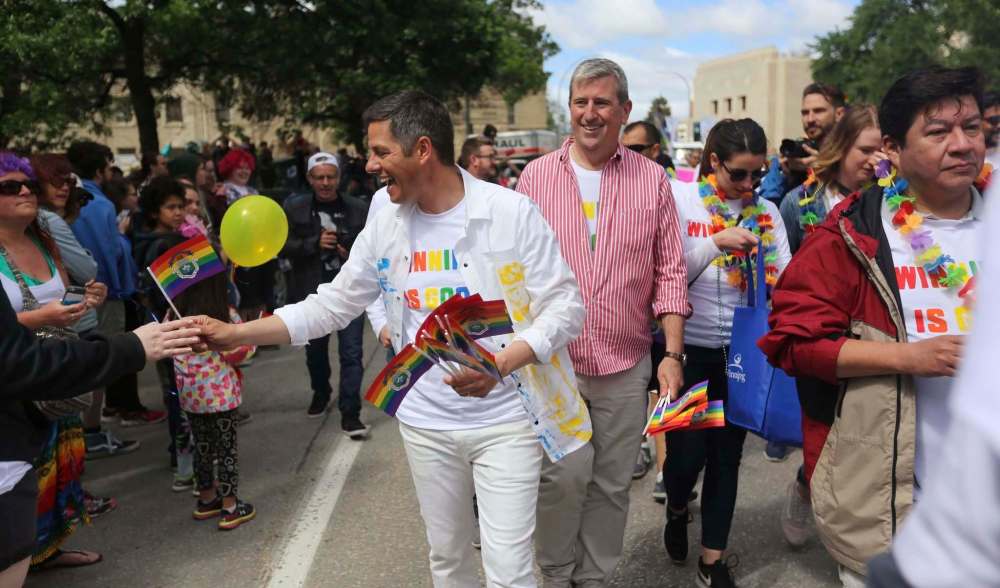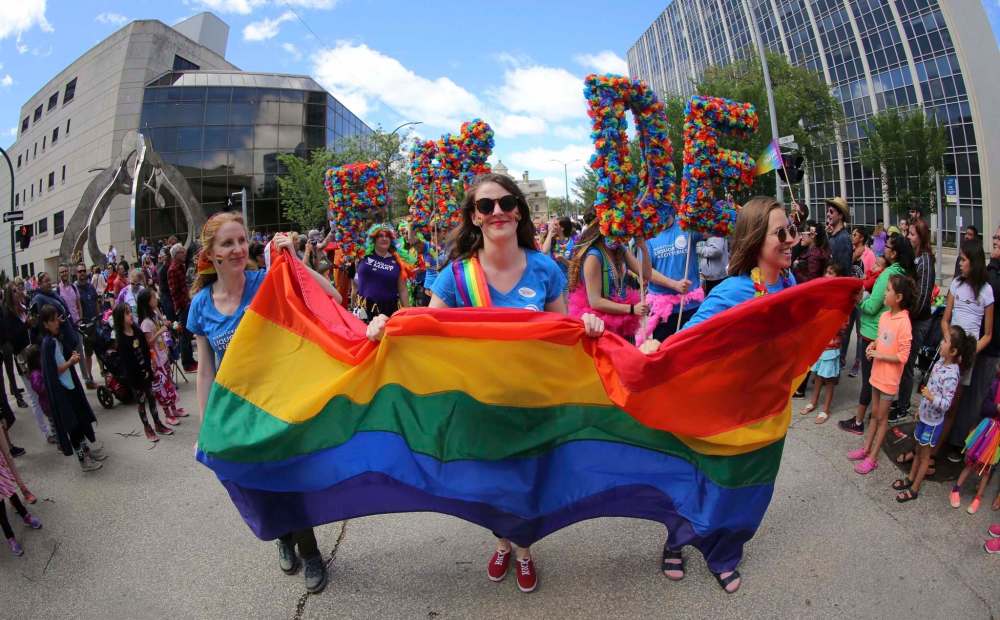Ex-mayor shares parade memories
Advertisement
Read this article for free:
or
Already have an account? Log in here »
To continue reading, please subscribe:
Monthly Digital Subscription
$0 for the first 4 weeks*
- Enjoy unlimited reading on winnipegfreepress.com
- Read the E-Edition, our digital replica newspaper
- Access News Break, our award-winning app
- Play interactive puzzles
*No charge for 4 weeks then price increases to the regular rate of $19.00 plus GST every four weeks. Offer available to new and qualified returning subscribers only. Cancel any time.
Monthly Digital Subscription
$4.75/week*
- Enjoy unlimited reading on winnipegfreepress.com
- Read the E-Edition, our digital replica newspaper
- Access News Break, our award-winning app
- Play interactive puzzles
*Billed as $19 plus GST every four weeks. Cancel any time.
To continue reading, please subscribe:
Add Free Press access to your Brandon Sun subscription for only an additional
$1 for the first 4 weeks*
*Your next subscription payment will increase by $1.00 and you will be charged $16.99 plus GST for four weeks. After four weeks, your payment will increase to $23.99 plus GST every four weeks.
Read unlimited articles for free today:
or
Already have an account? Log in here »
Hey there, time traveller!
This article was published 03/06/2018 (2746 days ago), so information in it may no longer be current.
With drums banging, rainbow colours flying on capes, flags and banners, thousands celebrated equality rights Sunday along a crowded downtown route for Winnipeg Pride.
A record number of entries and floats, — 105 — set off down Memorial Boulevard under a warm sun and a stiff north wind to trace a route along York Avenue to Fort Street before wrapping up at Bonnycastle Park across from the Upper Fort Garry provincial heritage site by noon.
The event kicked off at the legislature with a rally and speeches from political leaders, including Manitoba Premier Brian Pallister, Winnipeg Mayor Brian Bowman and Glen Murray, who was the city’s first openly gay mayor from 1998 to 2004.

The 31st annual parade, which drew some 35,000 last year and probably close to that this weekend, saw crowds still jammed at the start of the route as the parade wound up at the end some nine blocks away.
The grand marshal was a two-spirited Indigenous woman who urged the crowd not to rest on its gains or its privileges.
“White queer people aren’t absolved of guilt. You have a responsibility to speak up with the rest of us, speak up for us, hear our stories,” Brielle Beardy-Linklater urged. A northern woman, she disclosed she had been sexually assaulted in the city and is facing homelessness again for the second time in a year.
“Pride is political. We, the people who are poor, the working class, the marginalized, we need to be speaking out,” she said.
The politicians preferred to stress the gains that had already been made in decades of human rights battles.
“In terms of this event, we’ve been promoting Manitoba as a place of hope for people for a long time, throughout our history. Before our colonial history, we were doing that,” Pallister said in a scrum before giving the opening speech where he reinforced the message of inclusion.
Crowds listened for close to an hour to speeches, spilling off the legislature lawn to the bottom of Memorial Park, a lighthearted crowd bopping to music in the park, thousands beyond the reach of microphones a block away.
Bowman wore his colours, using his clothes to advertise a visible message of inclusion.
The mayor showed up in a white shirt, hand painted with colours to promote the LGBTTQ* community and the city’s multicultural mosaic.
“You’re probably wondering what’s the deal with the shirt? I asked my friend (Exchange District artist) Lennard Taylor to paint me a shirt that celebrated the diversity of Winnipeg. And if you look, you’ll see lots of different colours, just like each of you have,” Bowman told the cheering crowd. Underneath, he showed off a T-shirt emblazoned with the slogan “Winnipeg is good” in rainbow colours.
“You may have heard our Winnipeg Jets say that,” the mayor said to chuckles. Winnipeg NHL Jets star Patrik Laine coined the phrase in a blog when he confessed he was in love with Winnipeg.
Then the mayor got serious: “The reason Winnipeg is good is because of you,” he told the crowd. “You fought for the rights we hold dearly.”
Bowman introduced Glen Murray, who left the city to serve as a Liberal MPP in Ontario before founding an environmental consultancy.

Murray took the message of celebration and drilled down into its gritty roots. “That wasn’t very long ago,” he said. “When I started my political career in the ’80s, we were running needle-exchange programs. We were in the really dark early days of the AIDS epidemic, and in my first 10 years in Winnipeg, I lost 43 friends to that epidemic. They never would have imagined the view from here today,” Murray said, looking out over the crowd.
He and others, including the premier, noted the news this weekend of the death of Roland Penner, a former attorney general of Manitoba, dean of law at the University of Manitoba, author and social champion. As attorney general, Penner was known for his role introducing Manitoba’s first human rights legislation and including protections for sexual orientation.
Judy Wasylycia-Leis, who served in the same NDP cabinet as Penner, recalled those days as she watched the rally at the legislature.
“I remember the shouting when he introduced that,” she recalled.
So did Murray; he was on the committee that organized the city’s first Pride parade.
“At that time, people lost their jobs for being gay. People got kicked out of their apartments for being gay. People were murdering people with ball-cue hammers in the park down here,” he said.
“People marched in the first Pride parade in Winnipeg in (1987) wearing paper bags on their heads. You couldn’t find a politician, or a corporate sponsor, never mind a float,” Murray said.
“And why do we have the rights we do? To parent? To raise our children? Simply because of what you’re doing today: holding the hand of the person you want and walking proudly and equally down the streets of the community you love. Without fear,” Murray said.
alexandra.paul@freepress.mb.ca
History
Updated on Sunday, June 3, 2018 9:05 PM CDT: Adds sidebar on Russ Wyatt coming out as bisexual
Updated on Sunday, June 3, 2018 11:47 PM CDT: Edited
Updated on Monday, June 4, 2018 8:49 AM CDT: Removes sidebar, relates Wyatt story
Updated on Monday, June 4, 2018 9:33 AM CDT: Corrects typo
Updated on Monday, June 4, 2018 4:26 PM CDT: corrects date of first parade in Murray quote


